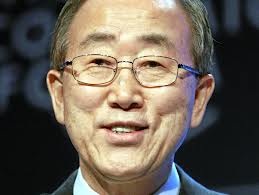UN: Towards a Rights-based Approach to Migration

Ban Ki-moon
The General Assembly High-level Dialogue on Migration and Development opened on Thursday 3rd October in New York with a call from United Nations Secretary-General Ban Ki-moon to implement measures that protect the rights of millions of migrants as well as recognize their contributions to society.
“It is our collective responsibility to make migration work for the benefit of migrants and countries alike,” Mr. Ban told the High-level meeting. “We owe this to the millions of migrants who, through their courage, vitality and dreams, help make our societies more prosperous, resilient and diverse.”
Indeed, the UN chief said, one need look no further than this morning’s headlines – reporting that scores of African migrants may have been killed or gone missing when their boat capsized off the coast of Italy – to see the great importance of this dialogue. “I offer my deep condolences and hope that we all take this as another spur to action.”
The two-day Dialogue seeks to identify concrete measures to strengthen cooperation and enhance the benefits of international migration for migrants and countries, while reducing its negative implications. The event will feature presentations by Member States and a slate of panel discussions on specific issues such as the links between migration and sustainable development, and labour mobility and its impact on development.
“I offer my deep condolences and hope that we all take this as another spur to action.”
Delegations began their work with the unanimous adoption of the Declaration by which the 193-member Assembly decided to work towards an effective and inclusive agenda on international migration that integrates development and respects human rights by improving the performance of existing institutions and frameworks. They also pledged to partner more effectively with all stakeholders involved in international migration and development at the regional and global levels.
The Declaration also emphasizes the need to respect and promote international labour standard and respect the rights of migrants in their workplaces. The Assembly strongly condemned “the acts, manifestations and expressions of racism, racial discrimination, xenophobia and related intolerance against migrants and the stereotypes often applied to them.” It also reiterated its commitment to prevent and combat trafficking in persons, protect victims of trafficking, prevent and combat migrant smuggling, and protect migrants from exploitation and other abuses.
In his remarks, Mr. Ban presented his report on International Migration and Development, which makes eight key recommendations to “make migration work” for all. They include: protecting the human rights of migrants who are frequently the subject of abuse and exploitation, lowering the cost of migration, and changing public perception of migrants, as many face discrimination on a daily basis.
The report also stresses the need to find ways integrate migration in the development agenda, improve data collection on migrants and the impact they have on development, and enhancing migration partnerships so governments, the private sector and civil society can share ideas and knowledge on mobility.
According to the UN, there are some 232 million international migrants. The day prior, the World Bank released its latest global remittance figures, which show that migrants from developing countries alone are expected to send home $414 billion in 2013, a 6.3 per cent increase from the previous year. This is projected to rise to $540 billion by 2016.
In his remarks, Mr. Ban noted that given the complex realities countries face – including the recent global economic crisis – it is essential for nations to “work together, with courage and vision, recognizing that our actions will have an impact on the lives of millions of women, men and children across the globe.”
General Assembly President John Ashe said Member States should learn from their experiences from the past seven years – when the first high-level meeting on the issue occurred – and move from dialogue to action.
“This means setting realistic targets, committing to implementation and monitoring progress. In short, we must hold ourselves accountable in following up our dialogue,” he said.
“We need to redouble our efforts to ensure that the contributions of migration are not only apparent to us, but also to the public at large. We have an important responsibility to get the message right.”
In a press briefing today, the Special Rapporteur on the protection of migrants, François Crépeau, highlighted the human dimension of migration, stressing migrants should not be seen as agents of global remittances only.
“Migrants are human beings with human rights, not simple agents of economic development remittances,” he said. “All migrants, by virtue of their human dignity without discrimination are protected by international human rights law, on the same footing as citizens regardless of their administrative status or situation.”
Mr. Crépeau urged countries to ratify all international human rights treaties including those pertaining migrant rights such as the Convention on Decent Work for Domestic Workers.
The member and former Chair of the Committee on Migrant Workers, Prasad Kariyawasam, told reporters a rights-based approach is essential to stop the abuse many migrants are currently experiencing.
“Although migrant workers are contributing in economic and social terms […] their rights are often violated,” he said, expressing hope that this meeting will address this discrepancy.
You may have an interest in also reading…
PJ O’Rourke: One of the Last of the Gonzo Journalists
A gonzo-style journalist par excellence, PJ O’Rourke will seldom fail to tackle serious societal issues with sarcastic humour and some
MIGA (World Bank): During the Storm – Shift from North to South FDI
By Manabu Nose and Moritz Zander[1] At MIGA (the Multilateral Investment Guarantee Agency) we see the principal near-term risks for
Christopher Colford: Speed Bumps Along the Road to Competitiveness
Egypt’s Self-Inflicted Limits on Economic Efficiency. It’s an axiom of economic policy: The future belongs to the efficient. In a

















































































